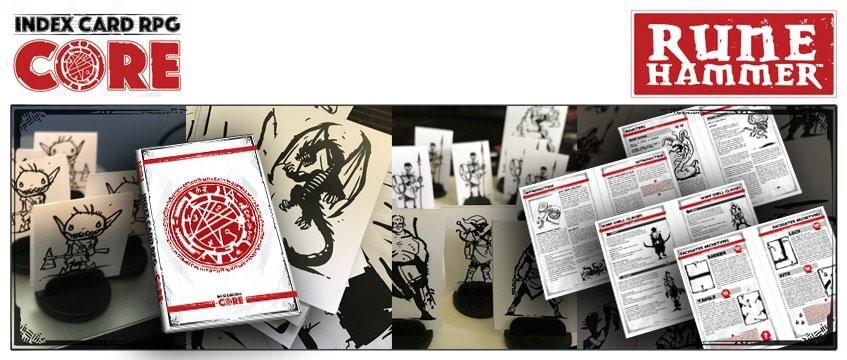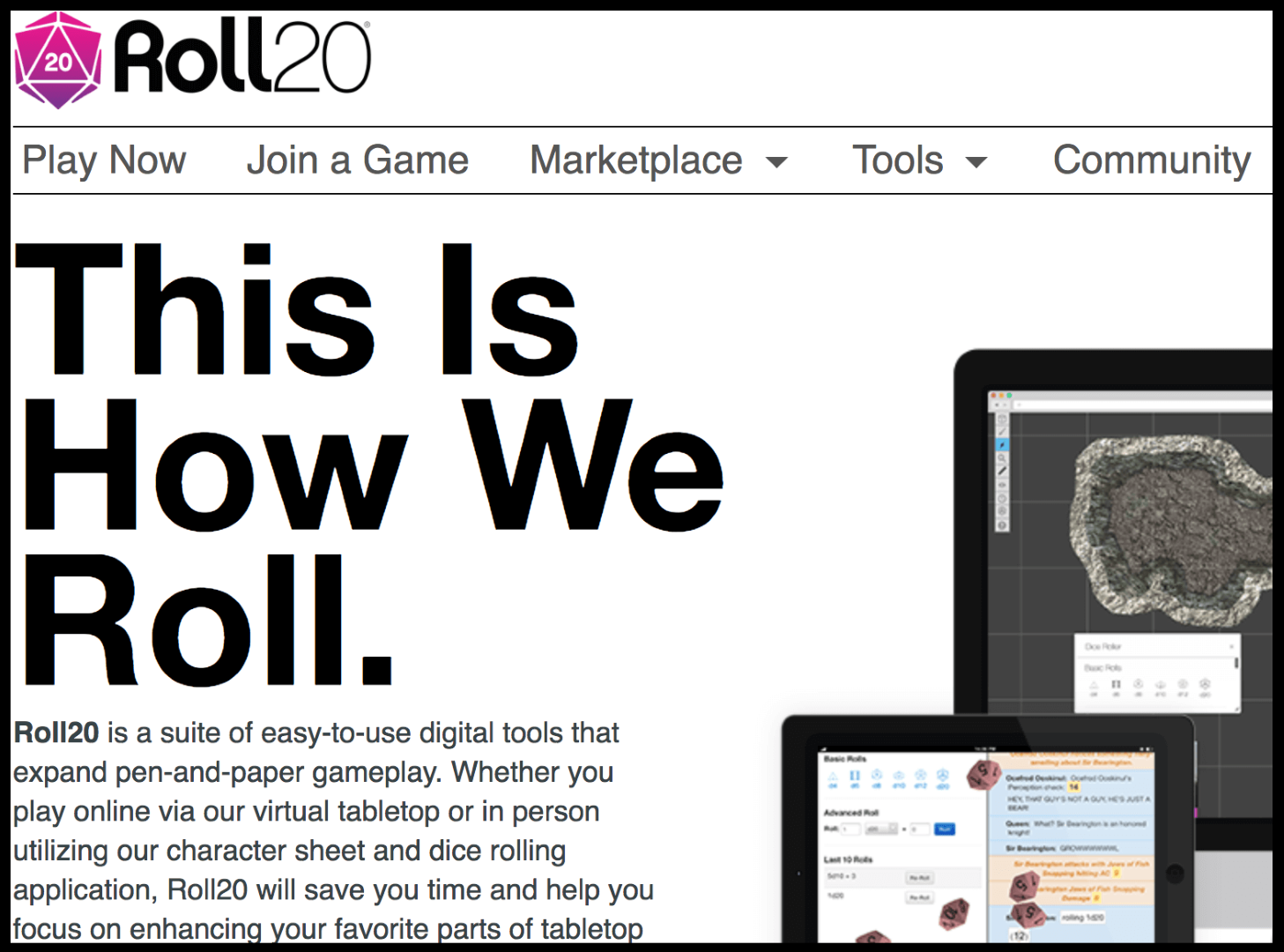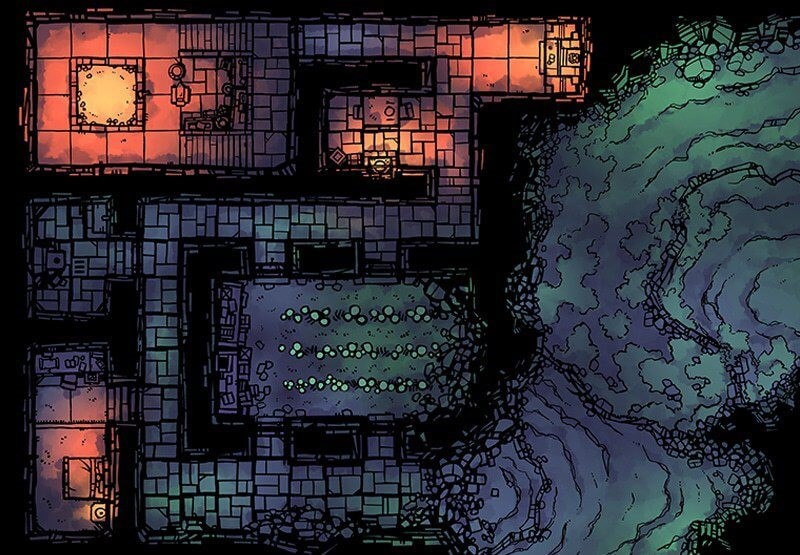A Game Built for Online Play

I have found playing tabletop RPGs online to be….awkward. Thankfully the Index Card RPG has provided me with an interesting framework to smooth online play for our group.
Some of the problems I’ve encountered online:
- It’s easy to talk over one another.
- Background noise or a bad mic can ruin your attempts to understand specific details.
- Face-to-face contact is a bit strange since everyone is looking at their computers, not the camera.
- It’s harder to read the room, since a lot of social cues are lost when playing online (nervous shuffling, dice stacking, etc).
- Maps and handouts are trickier to setup.
Thankfully we’ve got some tools to help us overcome these problems:
- Connection speeds and webcams get better every year. People can even use their phones to connect and play!
- Services like Roll20 and Fantasy Grounds do a great job of making the tabletop simple to use online (handouts, maps, battleground sketches, etc).
 I’m currently using Roll20 for my online games, and it works pretty well! Just takes a little getting used to…
I’m currently using Roll20 for my online games, and it works pretty well! Just takes a little getting used to…
However I recently discovered an RPG system that seems perfect for online gaming. All of the rules and advice blend together to create a smooth online experience.
Index Card RPG Permalink
Index Card RPG, so named because of its print-and-play nature, came out about a year ago in a flurry of excitement and fantastic artwork.
Designed by Runehammer games, the same team behind Drunkens and Dragons, it’s a simple, lightweight rules system with modules for fantasy, sci-fi, horror, and western adventures. I made a reference if you want a brief overview of the rules!

I don’t know if the ease of online play was an intended feature of the game, or merely an additional benefit. But ICRPG has been a bit of a eureka moment for me, and maybe it will be for you too.
Note: You can play any system you want online. Whatever works for you and your group. ICRPG isn’t demonstrably better or worse than anything out there. It just works better for me and does some interesting things I don’t see a lot of other games attempting.
Neato Online Features Permalink
Everything taken in turns.
Whether in combat, haggling prices in the market, or negotiating with the king, everyone goes around the table taking turns. On the GMs turn, they advance the world forward (enemies, allies, obstacles, etc).
This not only prevents people from talking over one another, but it also ensures that every player gets the chance to contribute. It’s easy for one or two of the more headstrong players to dominate the game. ICRPG side-steps this nicely.
It’s definitely a bit awkward at first. “Susan just decided to blackmail the king before I got the chance to charm the vizier. Now we’re in jail.” I implement a simple veto system whenever a player does something objectionable to the rest of the group. But this constant turn-taking ended up fixing more problems than it solves.
Room Target Number.
ICRPG uses a traditional “Roll over target number with d20 + modifiers” system that most people are familiar with. However to keep things simple a target number is set for the entire area, not for each element individually.
In a 12 room, players need to roll over a 12 to hit enemies, dodge arrows, leap chasms, and cast magic spells. Easy tasks are 3 points lower (9), hard tasks are 3 points higher (15).
It’s very easy for players to grasp what they need to roll, and removes hard-to-communicate details. “What do I need to roll to hit the goblin? What about the Goblin Chief? What about if I want to topple the tower onto the Goblin Chief AND the goblin?”
You do lose some complexity and nuance with this system, but I find it a worthy tradeoff, especially online where communication is difficult enough already.
Large Tasks Have “Health”.
I was extremely dubious at first, but my players have shown me how brilliant this rule can be.
We see this in combat all the time: Players to roll a d20 to see if they successfully attack the target, and then roll their weapon damage to see how much health they remove. When all the health is gone, the enemy is defeated.
ICRPG applies this concept to large tasks. That merchant has 10 “health” , and your charisma rolls will eventually wear him down. Tracking down the monster will take several rolls, depending on your wisdom score and “damage” dice.
Rather than weapon damage, there are different kinds of dice depending on the effort being applied. Are you solving this problem with magic? Roll d20 + mods to see if you are successful, and then roll the magic die (d8) to see HOW successful you are.
It meshes will with turn-taking aspect, forcing players to spend each turn carefully. “Do you want to spend your turn wearing down the goblin, or help Susan pry open the escape hatch?”
Timers.
This is the secret sauce that makes the turn-taking and the health system work. There should almost always be a timer that the GM sets in front of the players.
Not only is it useful for communicating threats (water level rising, enemy charging an attack), but it can be used for general pressure as well (hours before the markets close, tolerance of the palace guards).
When there is a timer on the table, every turn matters. It’s clear, concise, and can be easily represented in an online setting.
Consistent Dice Types.
All target numbers are rolled with a d20. All magical spells and effects are rolled with a d8. All weapon damage and tasks are rolled with a d6. And so on. Characters add different modifiers to those dice depending on their stats and items, but the dice themselves are always the same.
Not only does this make communication simpler (roll magic die + bonus), but I’ve found it to be a superior way to show consistent skill improvement. Upgrading a d6 to a d8 feels better to the player, but isn’t nearly as good as simply adding +2 to your rolls.
Fantastic Art Assets.
Probably the most useful and easiest thing to recommend are the art assets. ICRPG comes with a bunch of incredible artwork that is built for online tabletops. Monsters, heroes, items, environments, traps, objects, etc. Everything you need to bring your game to life online in a simple and consistent art style.
 *P.S. If you’re looking for solid battle maps and background for your online games, I highly recommend you check out 2-Minute Tabletop. A lot of his stuff is free, and his patreon is very generous!
*P.S. If you’re looking for solid battle maps and background for your online games, I highly recommend you check out 2-Minute Tabletop. A lot of his stuff is free, and his patreon is very generous!
See you online! Permalink
Even though I only have a few games of ICRPG under my belt, it’s been a really nice fit with the online format and my GMing style in particular.
If you’ve ever had trouble playing games online, I highly recommend you check out ICRPG. Even if you just get it for the artwork, it will be a huge boost to your digital table.
Have you found any other games that run particularly well online?